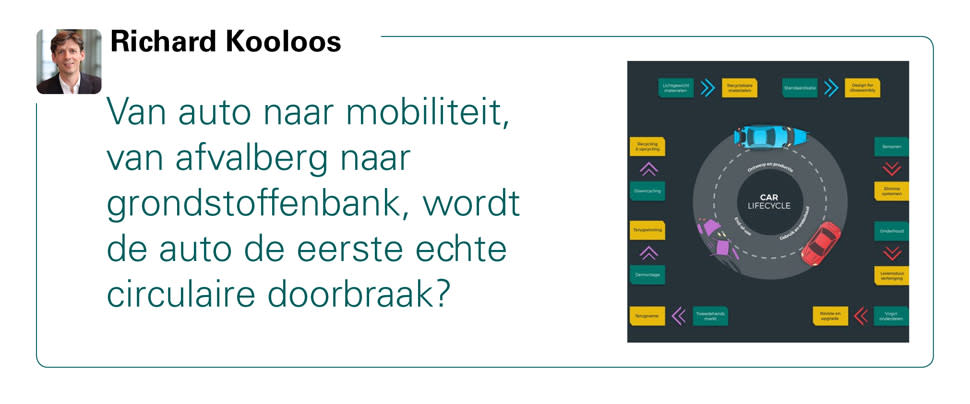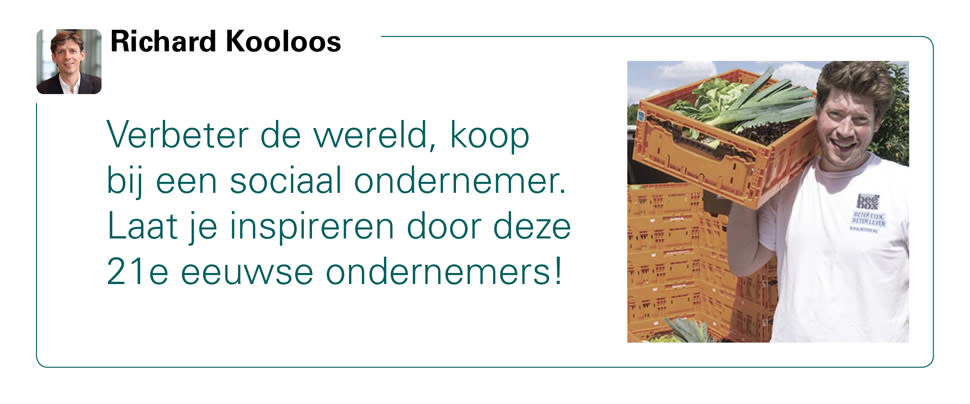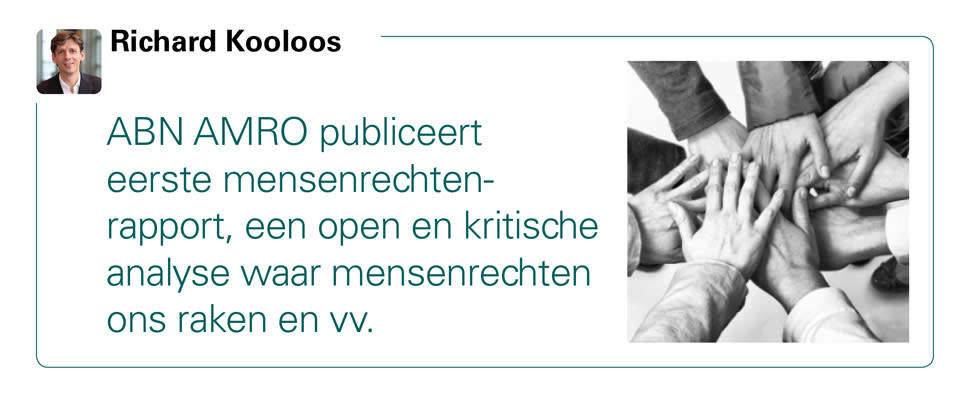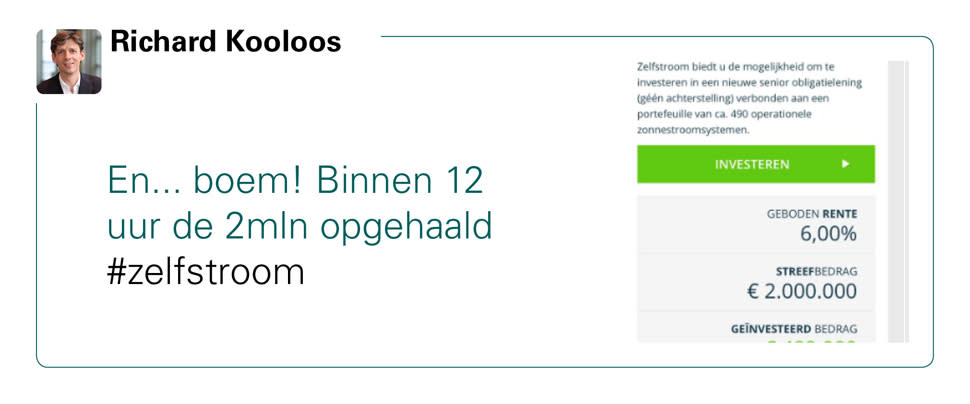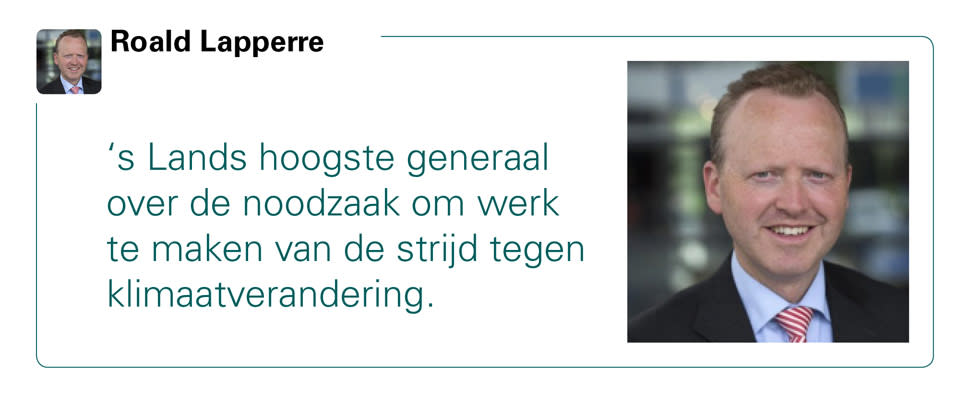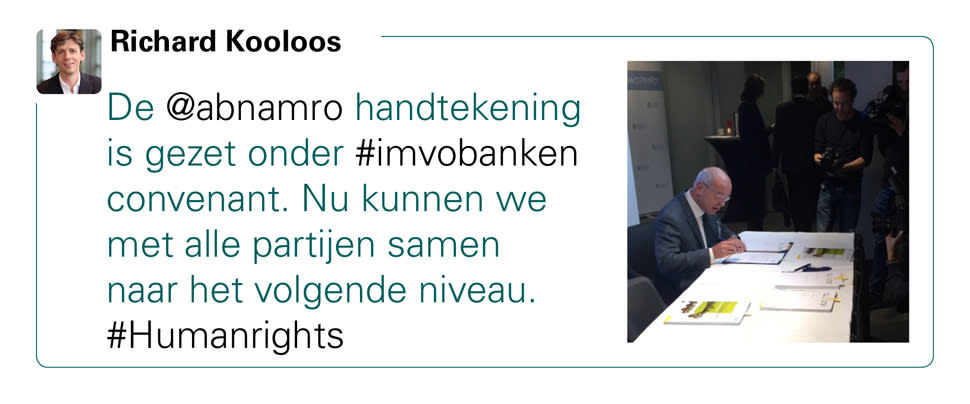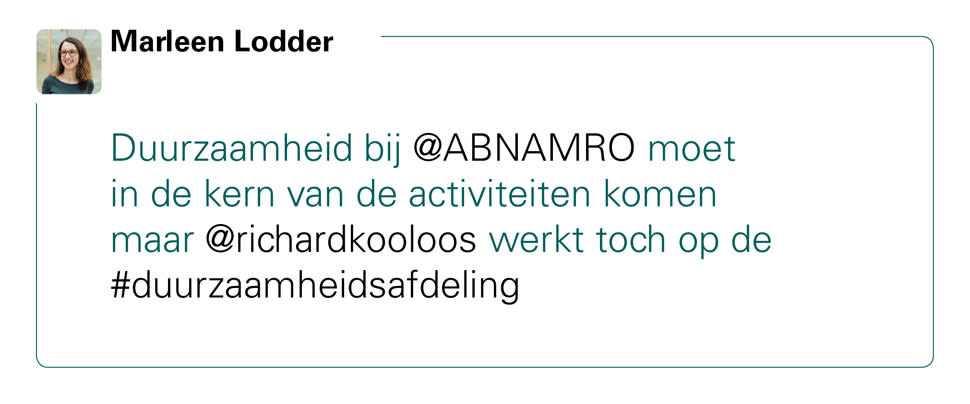Richard (re)tweets: “We should be proud we’re not perfect but still working to improve”


Head of Sustainable Banking Richard Kooloos ranks his favourite tweets and retweets once every three months. This quarter’s picks: ABN AMRO’s Human Rights Report, the link between climate change and the war in Syria, and Zelfstroom’s success.
Richard Kooloos, Head of Sustainable Banking at ABN AMRO and registered tweeter, pressed the tweet button more than 3,200 times in just over 2,100 days. He shares what he thinks, does and sees in the world of sustainability. This is his selection of tweets from the past quarter.
“What were only recently nebulous, largely theoretical concepts have the habit of becoming very real very quickly in today’s world. That’s true of the circular economy, too, which will be taking centre stage at the bank’s business and corporate entities starting in 2017. The effects of this focus will vary by sector – be it construction, transport, or logistics. One thing is certain, though: a concerted effort in these various fields will result in very real transactions.
“The problem is crystal clear. The global middle class is set to double in the coming years and will make significant claims on the same raw materials. That means that if a company wants to maintain the same level of prosperity and continue to grow, it will have to make some changes. While this may not be a pressing matter by 2018, it will become increasingly urgent in the next five to ten years. The good news is that, despite all the challenges, opportunities for companies abound.
“ABN AMRO intends to be an ‘action leader’ in this area, not a ‘thought leader’. In other words, we aim to do deals and facilitate transactions, teaming up with our clients to identify new possibilities and opportunities.”
“Social entrepreneurship is a laudable initiative in every respect. Committed to creating an economy that works for everyone, the bank has recognised the need to raise the profile of social entrepreneurs throughout the Netherlands. Unfortunately, consumers are often at a loss when it comes to identifying social entrepreneurs and their products. With the new search engine The Good Search, we’re hoping to help change all that. The Good Search makes it easier for consumers to find social entrepreneurs by listing them first.”
“ABN AMRO’s Human Rights Report 2016 is a real milestone. It examines all the bank’s activities, as well as those of the companies we finance or invest in on behalf of our clients, all through a human rights lens. It’s a balanced report outlining our strengths and weaknesses. For instance, it shows how employees in some countries have employment contracts which prevent them from joining a union. Such a clause obviously violates basic labour rights and runs counter to the international convention we’ve signed with unions saying that we endorse these rights. Obviously, we’re falling short of the mark in some areas, but the bank’s aim is to be honest, open and transparent in the report. In this way, we can set about creating new solutions to these problems.
“The report focuses on the most pressing issues for ABN AMRO: discrimination, labour rights and land-related rights, as well as privacy, which includes not only things like the relationship we have with our clients and the management of financial data, but also the security of payment transactions via apps. Systematic assessments will ensure more clarity with respect to the various risks incurred – risks which may have yet to be identified, yet are present nonetheless. Publishing these findings ensures progress, enforces rigour and guarantees transparency. Hopefully, other players, too, will follow our lead. I personally appreciate the fact that we’re not afraid to be vulnerable. After all, we should be proud we’re not perfect but still working to improve.”
“The Dutch solar energy equipment supplier Zelfstroom is now offering customers a solar panel subscription-based package. For just a few tenners a month, you can have a complete set installed on your very own roof, and the electricity they generate is yours. You can even opt to have your old panels replaced with newer, more advanced models in a few years’ time. And if Zelfstroom reaches a maximum number of customers, they’ll float the company via crowdfunding, generating EUR 2 million in just a few short hours. Kaboom!
“It’s great to see the investment appeal of sustainability. But it’s the way in which people are investing in sustainability that should serve as a wake-up call to the bank. It’s a shame that ABN AMRO can’t yet offer its own clients this type of financing. It’s important that we continue to remain relevant and take our cue from developments like this.”
“Just before war broke out in Syria, the country had been plagued by extreme drought for several years. Many young, unemployed men thus abandoned the countryside for the cities. The result was a powder keg that eventually exploded, with devastating consequences for the whole country. In hindsight, though, you could say that drought – itself a consequence of climate change – was one of the factors that ultimately led to civil war. Mass migration, in turn, leads to social unrest – one more argument for taking climate change seriously. While we may not yet be directly affected by extreme weather conditions here in the Netherlands, we are seeing the effects of one of its direct results: the recent influx of refugees.”
“At the invitation of Lilianne Ploumen, the Dutch Minister for Foreign Trade and Development Cooperation, trade unions, NGOs, banks and government authorities have been meeting to discuss how to join forces in countries where human rights are at risk. All the stakeholders have now signed an international corporate social responsibility covenant. Take the problem of land rights, for instance. In some countries, land can be seized from farmers because a particular company wants to expand. If you, a lender, are involved in building a factory on that land at a later stage, you will probably have no knowledge of such past events. From now on, though, we’re going to be looking at how lenders can be better informed about such events and how we can help local governments and businesses understand that such rights must be respected. Lenders can’t always just accept a building permit at face value because they simply may not have all the facts.”
“I agree in part with this tweet. As a department, our aim is to ensure that sustainable banking is the norm throughout ABN AMRO. So, theoretically, we shouldn’t actually need a separate department any more. The reality, though, is that we still have a way to go. Indeed, our department and staff are here to help the organisation pick up the pace.
“When I took this job, my mission was to ensure that the department would be phased out as quickly as possible. The thing is, new issues and challenges are constantly emerging in areas where we can make a real difference. For example, paying corporate tax certainly wasn’t considered a sustainability issue five years ago. But just look at the debate about tax havens and the impact that the Panama Papers have had. Another is the issue of the circular economy, which has become so important in such a short space of time.
“I’ve come to realise that there’s always something just beyond the horizon. And since we deal with sustainability day in, day out, we see what’s beyond the horizon faster than perhaps other parts of the organisation. That helps us ensure the bank as a whole can respond more quickly and effectively to the next opportunity that presents itself.”
